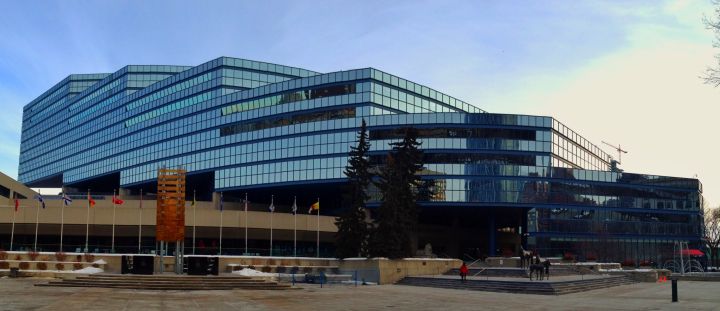Calgary city council has decided against adding another question to the ballot in the upcoming municipal election.

The question that was up for debate was “should Calgary city council advocate for a fair deal for Calgary taxpayers from the government of Alberta?”
The question referenced the city’s financial relationship with the province and how much money is sent to the provincial government through property taxes.
On Tuesday, Ward 14 councillor Peter Demong brought forward a motion asking council not to move forward with adding the question, and called the process disappointing.
Demong equated the question to asking if somebody likes dessert, with a likely answer of “yes, for most.”
“I definitely believe we should be regularly asking a variety of questions of the public each and every municipal election,” Demong told councillors. “Unfortunately, this just isn’t a good question. It will not give us any viable information other than to say people like dessert.”
Several councillors agreed with Demong, including Calgary’s mayor, who said the debate on the ballot question has served its purpose.
The ballot question was seen by many as a direct reference to the provincial government, which has added a referendum on equalization as well as Senate elections on the municipal ballot.
“It was all meant to be a bit of theatre… to highlight the fact that the province is being ridiculous, and in their plebiscite question on equalization, they are in fact messing with local democracy,” Nenshi said.
However, Nenshi added that he feels the city is poorly treated by the province in regard to its financial relationship.
Currently, the city sends a portion of property taxes to the provincial government as part of what’s called the education tax.
“The City of Calgary sends to the government of Alberta $5 billion per year more than we receive in government services — that’s more than the entire city budget,” Nenshi said. “But playing around with plebiscites and referendums isn’t how you fix that, you fix it at the negotiating table.”
The question from the province that will be added to the municipal ballot is “should Section 36(2) of the Constitution Act, 1982 — Parliament and the Government of Canada’s commitment to the principle of making equalization payments — be removed from the Constitution?”
It is a question that the city is legally obligated to have on the ballot this fall, according to the city’s legal team.
Premier Jason Kenney has said the equalization program is unfair to so-called “have provinces” such as Alberta that have been massive net contributors to equalization, but are now experiencing difficult economic times.
“Calgary, Alberta, we carried the downturn for Canada, because our oil industry,” Ward 4 councillor Sean Chu said. “We have paid so much to Canada but we did not get as much back.”
Council ultimately voted 11-3 to strike down adding the fair deal question to the ballot.
Councillors Druh Farrell, Jyoti Gondek and Gian-Carlo Carra were opposed.
“We’re still going into a municipal election with a non-municipal, extremely inflammatory, extremely grandstanding question on the ballot,” Carra said. “The problem with this style of politics is if you ignore it, it gets stronger, and if you fight it, it gets stronger, and we haven’t figured out what to do with it yet.”
Gondek, who represents Ward 3 and is running in the upcoming mayoral race, said she’d like council to rephrase the fair deal question if the wording was the issue with her colleagues.
“A fair deal isn’t just about the dollars. A fair deal isn’t just about the funding formula. It’s actually about building a relationship that allows for dialogue,” she said.
Gondek said she believes Calgary is not treated as a partner by the province, raising concerns with the EMS dispatch debate, the province’s rescinding of the 1976 coal policy and the former minister of municipal affairs refusing to intervene in councillor misconduct.
“We don’t have a partnership, we have no relationship, we have no fair deal — we have zippo,” Gondek told council.
Although a question about a fair deal for Calgary taxpayers from the government of Alberta won’t be on the municipal ballot, Nenshi said it is a valid question for voters to ask of their candidates running for council and mayor.
“A fair deal for Calgary should absolutely be a ballot question. You absolutely should be asking your candidates, ‘How are you going to ensure that Calgary citizens and taxpayers are getting a fair shake and the investment we need as the economic engine of this province?'” Nenshi said.
“It should be a ballot question, but it doesn’t have to be a question on the ballot.”
Calgarians will still be asked whether or not fluoride should be added to the city’s drinking water when they head to the ballot box on Oct. 18.
–with files from the Canadian Press



Comments